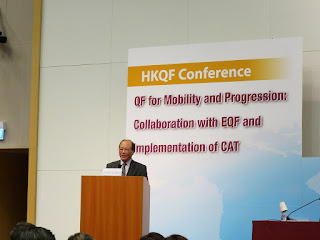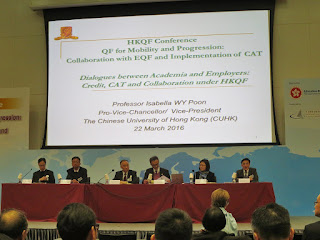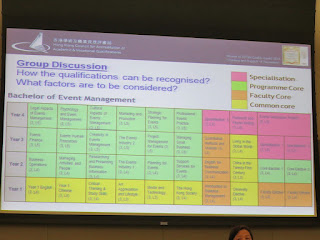In the beginning, Mr. Eddie NG, SBS, JP (Secretary for Education, HKSAR Government) gave a welcoming address. He briefed the comparability study of the Hong Kong Qualification Framework (HKQF) and the European Qualifications Framework (EQF).
The results of comparability study between HKQF and EQF was showed as following table.
The new guideline named “Policy, Principles and Operational Guidelines for Credit Accumulation and Transfer (CAT) under Qualifications Framework in Hong Kong” had just issued.
Group photo
The conference separated into two panels. The first Panel topic was “International Dimension of HKQF: Mobility of Learners and Employees arising from EQF Study”. Mr. Anthony CHAN (Project Co-ordinator, Education Bureau) was the panel facilitator.
Dr. Eva Cheng introduced that the
study had FOUR stages and FIVE principles below:
FOUR stages methodology
1. Analysing the purpose, governance, structure, operation, and QA of two frameworks
2. Carrying out a detailed level-to-level comparison of the level descriptors of the two frameworks3. Conducting a reality check with qualification types
4. Consulting local and international experts
FIVE principles
1. Transparent framework governance2. Level-to-level comparability
3. Outcomes-based learning
4. Clear and transparent mechanisms for inclusion of qualifications on QF
5. Robust underpinning QA arrangements in line with international principles
Finally, Dr. Cheng briefed their future plan included further cooperation and collaboration with Europe at different levels and communicated of this study findings with different stakeholders.
The second speaker was Prof. Chetwyn CHAN (Associate Vice-President, The Hong Kong Polytechnic University) (2nd Right) and his presentation was "HKQF and the EQF: Implications to Stakeholders". He said there were three implications of the results included Educational Institutions, Learners, Employers and Professional Associations/Unions. For education sector, Prof. Chan said internationalization of Hong Kong students through outbound exchanges and diversity of student population through inbound students so as to enrich students’ learning experiences (because of credit transfers cross Hong Kong and European Institutions).
The third speaker was Ms. Dorte KRISTOFFERSEN (Executive Director, HKCAAVQ) (Middle) and her topic named “Mobility of Learners and Employees arising from EQF Study – From a QA Perspective”. She said the QF comparability through international conventions such as Lisbon Recognition Convention (1997) and Bologna Process (1999) that National QFs were linked to EQF.
She concluded the use of the comparability study was one building block in establishing a zone of trust between education and training systems in Europe and Hong Kong but it contained limitations such as automatic recognition.
The last speaker of the 1st panel was Mr. Xavier LESTRADE (Chief Life Insurance Officer, AXA China Region Insurance Co., Ltd.) (2nd Left) and his presentation topic was “Experience of AXA”. Firstly, Mr. Lestrade introduced AXA and it employed 161,000 staff and 52,000 AXA Advisors. In Hong Kong, there were more than 1,100 employees and 5,000 AXA advisors. Mr. Lestrade said AXA core distribution strategy included Professionalism, Innovation and Digital.
Then Mr. Lestrade introduced AXA Academy and its cooperation with HKQF to launch Level 3 certificate courses. Its implications included to provide opportunities for AXA employees and advisors to enrich their qualifications throughout their professional career, to reinforce the foundation of international mobility between Hong Kong and Europe, as well as, to transfer of AXA global best practices in learning and development both in technical and client facing positions.
During tea break, we visited the CAT Marketplace.
We visited OUHK and took a photo with Dr. George HK Lau (Asso. Professor & Programme Leader (Testing & Certification), School of Science and Technology, OUHK), Mr. Matthew Yien (HKQF – ITAC Secretary) and Ms. Fanny Tang (Lecturer, OUHK).
The second Panel topic was “Dialogues between Academia and Employers: Credit, CAT and Collaboration under HKQF”. Mr. Patrick PANG (General Manager, Qualifications Framework Secretariat) was the panel facilitator. (1st Right)
Prof. Isabella WY Poon (Pro-Vice-Chancellor, The Chinese University of Hong Kong) (2nd Right) was the first panelist. Prof. Poon stated that CUHK supported lifelong learning in HKQF context.
Prof. Poon said vertical transfer through CAT usually from Level 4 and Level 5. Then Prof. Poon introduced CUHK graduate attributes included Knowledge (K), Professional and generic skills (S), Attitude and values (V).
Then she mentioned the CUHK credit unit system that Ug minimum requirement was 123 units in which 1 indicated 1 contact hour per week, 0.5 to 2 off-class learning hours per week, 1.5 to 3 learning hours per week and over a term of some 13-14 weeks (around 21 – 42 hrs). The core requirement of Senior Year (SY) entrants were discussed as following table.
The second panelist was Dr. Lawrence Chan (Deputy Executive Director, Vocational Training Council). Firstly, Dr. Chan introduced VTC which established in 1982. There were 13 member institutions providing comprehensive vocational and professional education and training (VPET) and seamless progression pathway for career advancement and lifelong learning.
Then Dr. Chan briefed the 21st Century Student Competencies included “Integrated Person”, “Forever Learner”, “Positive Contributor” and “Global Citizen”.
The third panelist was Mr. David LEUNG (Head of Operations Training, MTR Corporation Ltd.) and his topic entitled "Achieving Professional Excellence – T&D Practices in MTR". Mr. Leung said “Our mission is to support in successful achievement of Corporation’s Railway business objectives and Operating Agreement through provision of centralized High Quality and Cost-Effective railway training.
Mr. Leung told us their core elements were Strategy, Process and People. They serviced more than 17,000 staff in Hong Kong and 18,000 in global. In 2015, total number of class delivered in Hong Kong was more than 7,000. Then mtrAcademy was introduced and its services included “Operations Training”, “Management Training” and “Development Scheme”.
The fourth panelist was Mr. Patrick Wong (Executive General Manager, HAECO) (2nd Left) and he introduced HAECO Group milestones since 1950s. Their services included Airframe Services, Cabin Solutions, Component Services and Engine Services.
Then Mr. Wong mentioned HAECO Group Learning Centre and they conducted 4,010 technical training courses in 2014 and 59,900 students had been trained. Their trainee programs were show as follows:
- Graduate Trainee Programmes included Licence Stream, Technical Stream, General Stream and Specialist Stream
- Aircraft Maintenance Mechanic Trainee Programme (Diploma, VTC)
- Aircraft Maintenance Craftsman Trainee Programme (DSE Graduate, IVE)
Dr. Aaron CHIANG (Head of Human Resources & Administration, Hong Yip Service Co., Ltd.) was the last panelist. Dr. Chiang introduced this company profile firstly.
And then he introduced the structure of Hong Yip People Development Academy in the following diagram. Hong Yip was the first company in the property management industry accredited by the HKCAAVQ to offer training programmes from Level 1 to Level 3 of the Qualifications Framework since June 2010. They also participated Recognition of Prior Learning (RPL) and Credit Accumulation and Transfer System (CAT) through collaboration with Caritas, VTC and HKCT.
In afternoon session, there were two parallel sessions. Workshop entitled "CAT Implementation by HKCAAVQ" which I joined. The other one was QR Operators’ Briefing by HKCAAVQ.
During the workshop, we had group discussion about CAT in some simulated cases including SCS-based Programmes and Outcome-based Programmes.
Reference:
Hong Kong Qualifications
Framework (HKQF) - http://www.hkqf.gov.hk/guie/home.asp
Report on the Comparability Study
of HKQF and EQF - https://www.hkqf.gov.hk/en/news/whats_new/index_id_91.html
Policy,
Principles and Operational Guidelines for Credit Accumulation and Transfer
(CAT) - https://www.hkqf.gov.hk/filemanager/common/CAT/C.A.T.%20Booklet.pdf



























沒有留言:
發佈留言